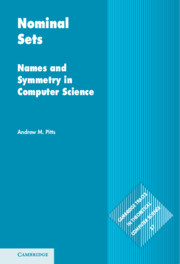Book contents
11 - Domain theory
from PART TWO - APPLICATIONS
Published online by Cambridge University Press: 05 July 2013
Summary
Chapter 10 considered functional programming with data involving names and name abstractions. The new language features introduced in that chapter were motivated by the theory of nominal sets introduced in Part One of the book. We encouraged the reader to think of the type and function expressions of the FreshML functional programming language as describing nominal sets and finitely supported functions between them. However, just as for conventional functional programming, the sets-and-functions viewpoint is too naive, because of the facilities these languages provide for making recursive definitions. Giving a compositional semantics for such language features requires solving fixed-point equations both at the level of types (for recursively defined data types) and the level of expressions of some type (for recursively defined functions). As is well known, solutions to these fixed-point equations cannot always be found within the world of sets and totally defined functions; and this led the founders of denotational semantics to construct mathematical models of partially defined objects, functions, functionals, etc., based on a fascinating mixture of partial order, topology and computation theory that has come to be known as domain theory. For an introduction to domain theory we refer the reader to Abramsky and Jung (1994).
In this chapter we consider merging domain theory with the concepts from nominal sets – names, permutations, support and freshness. As a result we gain new forms of domain, in particular domains of name abstractions.
- Type
- Chapter
- Information
- Nominal SetsNames and Symmetry in Computer Science, pp. 219 - 239Publisher: Cambridge University PressPrint publication year: 2013



